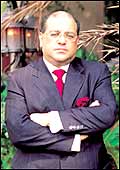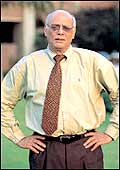 |
| It's still Tata (Tata Motors Chairman, Ratan
Tata, above): But Tata Motors offers a better picture of
what the company does |
When
it comes to announcements regarding people or companies changing
names or addresses, print rules. One glance at the classified section
of dailies should be adequate proof of this. So, it wasn't altogether
surprising that one of the most high-intensity print campaigns of
August and September had everything to do with India's largest truck-maker
changing its name. The campaign itself was nice in a touchy-feely
sort of way: soft focus visuals, a complete absence of the predictable
cars or trucks, lots of text, a few subtle pats-on-the-back and
a few more not so subtle ones, and the announcement about the change
in name.
For those who missed the campaign, this was
all about Tata Engineering changing its name to Tata Motors. The
company had originally been christened Tata Engineering & Locomotive
Company when it was founded in 1945, but the name had been rapidly
abbreviated to TELCO (tell ko, phonetically) and then changed, not
too long ago, into Tata Engineering. Tata Motors isn't a bad choice:
After selling 2.2 million trucks and buses, putting India's first
indigenously developed car on the roads, and establishing a presence
in 70 countries, any company can be pardoned a little hubris; and
Tata Motors may well have adopted its present name to indicate its
aspiration to be a global car maker of note.
Every car major in the world loves the suffix
'Motors'. General Motors. Ford Motor Company. DaimlerChrysler Motors.
Honda Motors. Hyundai Motors. Suzuki Motors.
Tata Engineering isn't alone. Not too long ago
a clutch of Indian cellular phone companies in which Hong Kong's
Hutchison Whampoa had a controlling stake changed its name to Hutch,
creating in the process, what was then the country's second largest
cellular network. VAM Organics morphed into Jubilant Organosys in
late 2001, replete with a logo redesigned by Shombit Sengupta's
Shining Strategic Design. Chennai-based FMCG upstart Chik India
turned into Beauty Cosmetics, and again into CavinKare-whether this
was a play of its founder C.K. Ranganathan's initials or Calvin
Klein, or both isn't known-in 1998. Tobacco major ITC dropped its
dots (it was I.T.C. before) in 2001. Then there's the by-now well-chronicled
example of Asea Brown Boveri becoming ABB-and how the company used
the change in name to create a new organisational culture-internationally
and in India, in 1993. More recently, Philip Morris became Altria,
a play on the Latin word for height.
So, why do companies change names? And does
it really make any difference to the way they do business and the
people they do it with? "Well, some (old) names give out wrong
equities," explains marketing consultant Harish Bijoor. "ITC,
now, isn't just about tobacco." His reference is to the fact
that the company's old name I.T.C., drew attention to the dots,
normally used in abbreviations, thereby harking back to the full
form Imperial (and then Indian) Tobacco Company. That wouldn't do,
not when the company was diversifying into hospitality, food, infotech,
and other services.
Bombay House, the Tata Group's nerve centre,
has been abuzz with proposals to change TELCO's name since the mid-1990s.
First, the company had to focus on improving its own skills, in
design, manufacturing, and marketing. Then, between 2000 and 2002,
with its performance flagging (and bottomline bleeding), the company
couldn't change its name-any move would have been seen by shareholders
as an effort to deflect focus from financials. Now, says a Tata
Motors spokesperson, "It's all about growth and a bit of international
aspiration." "We are driving a change in mindset through
this new name, embarking on a journey that will be increasingly
global," he adds. That may sound strikingly superficial, but
spin-doctoring, it isn't: Tata Motors is in the middle of an exercise
that involves cost reduction, business restructuring, quality upgradation,
and product development.
The desire to use the occasion to communicate
a change in direction, reckon experts, is the best reason for a
company to want to change its name. Consider the case of 20-year-old
VAM Organics. VAM is an abbreviation for vinyl acetate monomer,
not exactly the most creative name for a company. Still, until the
mid-1990s most of the company's revenues came from this bulk chemical,
and the name was fine. By the end of the same decade, though, things
had changed: Speciality chemicals accounted for half of VAM Organics'
revenues. And so, after much soul-searching, the company changed
its name to Jubilant Organosys. "The new name reflects a change
in our focus from bulk chemicals to being a knowledge-driven company,"
says Shyam Bhartia, Chairman and Managing Director. That, he explains,
is much like an internal mission statement, a statement by the company
that it is no longer a mere dabbler in commodity chemicals. The
new name, and the new tack, helped the stock soar, and it enabled
the company hold its own against international competition.
Indeed, companies that merely change their
names, without doing any of the other things they need to do to
convince customers and other stakeholders that something about them
is different, will, more often than not, fall flat in their effort.
"Rebranding isn't something that spills out of the billboard,"
says Harit Nagpal, Vice President (Corporate Marketing), Hutch.
For Hutch, which was launching its eponymous brand for the first
time anywhere in the world in Delhi in June 2002, the exercise went
back to late 2001. "We brought all our billing, product, customer
services, feedback and supplier-led processes around what the consumer
wanted, and not what we had to offer," says Nagpal.
So, will Tata Motors' new image go down well
with customers? Only its next quarter's sales will tell.
When Families
Go To War
A split in a business group may bode well for
business but there's enough reason to
manage it.
 |
| A Nanda: On the warpath |
 |
| R. Nanda: What went wrong |
The
19th century pistols that adorn the walls at Anil Nanda's residence
in Delhi's upmarket Friends Colony borough are perhaps indication
that the hitherto low-profile Nanda can shoot, but prefers to wait
for the right time. In June this year, the 51-year-old younger son
of the late H.P. Nanda, the founder of the Rs 1,000-crore Escorts
group, decided to part ways with his elder brother Rajan Nanda by
buying out the family's 27 per cent stake in Goetze India, an auto
components maker. At that time, it looked like the usual business
family break-up where one member opts out to do his own thing.
Now, a few months later the brothers Nanda
are engaged in a spat over the proposed sale of 17.1 per cent equity
in Escorts Heart Institute and Research Centre, a Delhi-based super-specialty
hospital. "It's a charitable trust run by Escorts and if someone
tries to sell off a part of it, it can be deemed illegal,"
contends Anil Nanda, now Chairman and Managing Director, Goetze
India. Rajan Nanda hasn't been as vocal as his sibling on the issue
(he declined to speak to BT for this story).
L'affaire Nandas is the second high-profile
family spat in recent times. Earlier this year, the Swadeshi Jagran
Manch's S. Gurumurthy helped hammer out a compromise between the
warring Bajaj brothers, Rahul and Shishir. According to Ashwani
Puri, Country Leader (Corporate Finance and Recovery), PricewaterhouseCoopers,
differences in business families crop up due to softer reasons like
envy, differing aspirations and control. "Financial matters
usually are not the genesis of a flashpoint." In this case,
with Rahul Bajaj's sons managing key functions, Shishir Bajaj saw
no role for himself or his family members in the company. Puri warns
that disputes such as these could delay the decision-making process
and affect employee morale.
That's a fact, but not all splits are disagreeable.
"One such split is that of the Mariwala family, where they
studied instances of family disputes in both India and abroad, worked
together to chalk out options, and negotiated the settlement in
a 'gentlemanly' manner," says Gita Piramal, author of Business
Maharajas and Managing Editor The Smart Manager. And a split could
reintroduce focus as groups diversify under new leaders. Given the
fading fortunes of the majority of business groups- Escorts included-maybe
splits should be deemed mandatory.
-T.R. Vivek
The Mentor
Trap
Or the perils of having a Godfather.
Heard
what happened with Arshad Zakaria? The 42-year-old head of investment
banking and global markets at hoary Wall Street firm Merrill Lynch
resigned in August, within the week of the departure of his mentor,
Vice Chairman Thomas Patrick, from the company. Call it the mentor
trap.
When a mentor leaves a company, his protégés
better watch out. "Any professional runs the risk of being
at sea in case his boss happens to leave," warns Sunit Mehra,
Country Manager of search firm Hunt Partners. If they don't want
this to happen, adds R. Suresh, Managing Director of headhunter
Stanton Chase, they have to swear loyalty to the new regime. "Companies
encourage such people to change their loyalties because, over time,
they have developed certain key competencies that the company values."
This phenomenon is common in India Inc. When the celeb-CEO of a
fast moving consumer goods company recently quit over a disagreement
with the board of directors, his protégé was quick
to change sides. And when the head of marketing of an auto major
recently left, his deputy, hired by him, was quick to communicate
to the board that his loyalties lay with the company, not the individual.
Axiom: All past mentors are tormentors.
-Moinak Mitra
Bring On
The Temps
Meet India's hottest business circa 2003: Staffing.
 K.
Pandiyarajan, the 42-year-old
managing director of Ma Foi (Take my word for it, in French) operates
out of a 3,000-square feet office in Chennai's Khadar Nawaz Khan
Road. The size of the office doesn't do justice to the magnitude
of the one-time Eisenhower Fellow's ambitions, or that of his business.
Ma Foi, founded in 1992 by Pandiyarajan with a capital of Rs 60,000,
expects to close this year with revenues in excess of Rs 100 crore.
And with 6,000 people on its rolls- these work for 192 clients across
280 locations-Ma Foi is India's largest staffing outfit. K.
Pandiyarajan, the 42-year-old
managing director of Ma Foi (Take my word for it, in French) operates
out of a 3,000-square feet office in Chennai's Khadar Nawaz Khan
Road. The size of the office doesn't do justice to the magnitude
of the one-time Eisenhower Fellow's ambitions, or that of his business.
Ma Foi, founded in 1992 by Pandiyarajan with a capital of Rs 60,000,
expects to close this year with revenues in excess of Rs 100 crore.
And with 6,000 people on its rolls- these work for 192 clients across
280 locations-Ma Foi is India's largest staffing outfit.
As staffing, or manpower-outsourcing gains
currency, Pandiyarajan and a clutch of entrepreneurs like him are
set to make a killing. One such is Arvind Swami, a one-time star
of Tamil films who, as Division President and Managing Director
of the Chennai-based Prolease India, oversees an army of 3,000 employees
serving time at consumer product, retail, infotech, and manufacturing
firms.
A couple of thousand kilometres away in Delhi,
46-year-old Tapas Kar manages 400 temps. By early 2004, this number
could swell to 1,500. Kar started off as an hr consultant but moved
rapidly into what he considers the most happening hr market going.
Rohit Mathur couldn't agree more. He is Director (Operations) of
Manpower India, the local arm of a US multinational that provides
staffing services to 400,000 clients. In India, the company has
800 staffers on its rolls and boasts revenues of Rs 5 crore (Mathur
expects this to double next year).
It makes sense for companies to take the staffing
option. It is less-expensive, hassle-free, and quick. Telecom major
Bharti, for instance, says its Director (HR), Jagdeep Khandpur,
hires between 800 and 1,200 temps a year. LG doesn't hire any temps
in India yet, but its head of hr Dr. Y.V. Verma believes staffing
is the way to go. "Outsourced manpower has no permanent liability
(on the company) and it ensures freedom from unions."
A staffing company typically earns margins
of between 12 per cent and 40 per cent. Strangely, that range overlaps
that of churn in the industry, between 25 per cent and 30 per cent,
with most people quitting staffing companies to sign on full-time
with clients. Maybe they're just formalising the relationship.
-Moinak Mitra
|
